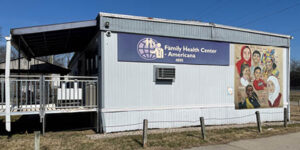
It is not the Tower of Babel, but extensive outreach programs at Family Health Centers in Louisville, Kentucky, attract patients who speak a remarkable number of languages.
English is common. However, the city attracts a sizable number of refugees and immigrants. At least a quarter of patients have limited English ability. Spanish, Arabic, Somali and Swahili speakers abound.
Indeed, the health center’s staff routinely encounters 40 different languages every month. The center spends more than $1 million annually on language services, said Melissa Mather, the Chief Communications Officer. “We have to have good interpreters to do the work,” she said.
Outsiders sometimes view Kentucky as an insular place best known for horse racing and fine bourbon, but the Bluegrass State has been a magnet for immigrants for years. Newcomers hail from countries ranging from Iraq to the Democratic Republic of Congo.
The center opened its Americana clinic for immigrants and refugees in a trailer in 2007, said Liz Edghill, Director of Refugee and Immigrant Services. Family Health Centers offers specialized treatment to survivors of torture, including physical and mental health services, Edghill said.
The center also has an extensive outreach program for homeless patients.
Judy Brendle, Health Care for the Homeless Supervisor, said the center’s Phoenix program for the homeless launched in 1988. In addition to primary care and mental health services, Phoenix offers a medical respite program and works with a local homeless coalition to help people find housing. About 125 formerly homeless people are now in supportive housing.
“Those people who are most likely to die on the street get priority for housing vouchers,” Brendle said.
